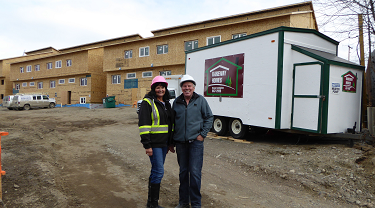At first, it seemed like a typical construction loan to an experienced company building two- and three-bedroom condominiums in Northern Canada. With $5 million in early sales, the new development in the established Whitehorse neighbourhood was 50% complete.
Dan Murza had flown from the First Nations Bank of Canada (FNBC) in Saskatoon to visit the work site and meet Wayne Cunningham, the owner of Kareway Homes. As the associate vice-president of commercial banking at FNBC, Murza takes pride in making in-person visits with clients and to tour the projects FNBC funds.
Halfway through the build, Cunningham needed more funding to keep pace—moving trucks were scheduled to arrive in six months with the first buyers. With steady interest in the remaining condos, getting approved for financing should have been a no-brainer.
But everything changed when the COVID-19 pandemic hit. Financial institutions across Canada were forced to make difficult decisions in what typically would have been straightforward loan approvals. “We felt terrible,” Murza remembers when he told Cunningham the extra credit wasn’t available. Almost overnight, real estate values became uncertain. No one knew if there’d even be a real estate market in six months. For the people who’d already bought a modern 2,000-square-foot condo in the development, there was concern those deals could fall through. “The timing was just the worst,” recalls Murza.
COVID-19 pressures grow
Cunningham, who has been in the construction business for 40 years and is past-president of the Yukon Homebuilders’ Association, told his suppliers about not getting the loan. He wasn’t ready to pull the plug on the job, but he wanted to be upfront with them about the challenges he was facing. He’s worked with two of his biggest suppliers for years and depends on them for lumber, windows, doors and many interior finishes.
It wasn’t long before Cunningham started losing sleep about keeping up with his payroll costs. Layoffs would be more than just stressful and depressing—some of his year-round staff have been with him for 25 years. “They’re like family. And think of all that training we’d have to do when it came time to hire new people,” Cunningham says, shaking his head. To make matters worse, when the call to implement social distancing went out, phone calls from potential buyers went from a few a week to zero.
“I understood why it was happening, but losing the loan was devastating,” Cunningham remembers. His wife Carol, nods in agreement. The pair have been married almost 40 years. She works closely with her husband through her own company and takes care of sales, customer relations and product research for him.
“Losing funding wasn’t a speed bump,” she recalls. “It was more like falling off a cliff.”
The couple found themselves borrowing from friends and putting expenses on their credit cards as they looked for ways to finance the rest of the build. The only options they found would make the project far more expensive than anticipated.
Then they got an unexpected phone call from Murza, telling them FNBC was in the middle of rolling out programs related to the Government of Canada’s Business Credit Availability Program (BCAP). Murza thought adding a new BCAP initiative to the loan—one led by EDC—would get them the interim funding they needed to finish the project. Cunningham filled out the application that same day. With EDC’s support, there would be much less risk for their bank. Two days later, the loan was approved.
Making that phone call was deeply gratifying for Murza. “Once the BCAP program rolled out, it ended up being an extremely quick process for a deal of this nature to assemble, push through and even fund. It gives the business what they need, and the guarantee gives the bank the comfort they need, given the pandemic environment.”
FNBC is looking to use EDC support under the new program for clients in many sectors, including forestry, retail, hospitality, aviation and industrial contracting. Because many businesses are already feeling overwhelmed, the bank has decided to be proactive and reach out to their commercial clients with different solutions to challenges brought on by the pandemic.
“For a new program, I was impressed with the support EDC provided and their quick response times,” says Murza. “It made it easier on us to implement the new program and offer it to customers promptly, which is invaluable because we all know how badly businesses in Canada need cash flow support right now. Time is of the essence and EDC has done well with getting this program out there.”
“These tools open the door to a lot of different businesses to qualify for financing that they couldn’t otherwise have qualified for and help their business through this really tough time.”
EDC’s mandate has been extended to support Canadian companies that don’t export—in addition to the thousands of exporters we already serve. But Murza admits many of FNBC’s customers don’t know how they can benefit from the EDC and FNBC partnership. Right now, most are just trying to stay afloat through this global health crisis. They’re struggling to wrap their head around their current financial situation, as well as trying to forecast where they’ll be in six months and beyond. “Most are doing a great job figuring out the impact of COVID-19 on their business—what their needs are, projecting the future, and the potential for recovery,” he says.
Murza recommends Canadian business owners reach out to their financial institutions to find out what help they can provide. “From there, if the financial institution has a full arsenal of different tools, including EDC’s programs, they should hopefully find a solution to meet their working capital needs,” he says. “These tools open the door to a lot of different businesses to qualify for financing that they couldn’t otherwise have qualified for and help their business through this really tough time.”
As for Cunningham, he’s already applying to get work permits on his next construction project. With extra health and safety measures in place for his crew and a strong relationship with his bank, he’s optimistic about the future. “Calls to see the remaining condos have started up again,” he says. “Things are definitely looking up.”
About First Nations Bank of Canada
First Nations Bank of Canada (FNBC) is a Canadian chartered bank primarily focused on providing financial services to the Indigenous marketplace in Canada. FNBC is more than 80% Indigenous owned and controlled and 90% of its client base is Indigenous. The bank offers Indigenous and non-Indigenous people, corporations and governments a full range of personal and business banking services including loans, mortgages, investments (registered and non-registered), transaction accounts and cash management services, as well as trust services through its wholly-owned subsidiary, FNB Trust.
About Kareway Homes
Kareway Homes is a family-owned and operated Yukon business that builds everything from small starter homes to million-dollar custom homes, commercial shops and buildings, and large multi-family townhome developments. Owner Wayne Cunningham has more than 40 years of construction knowledge and experience. His wife Carol also has a wealth of experience working with clients and design expertise. For the last 20 years, Kareway Homes has proudly served Northern Canada with a variety of building projects, working with individual home owners, government agencies, and local First Nations.





